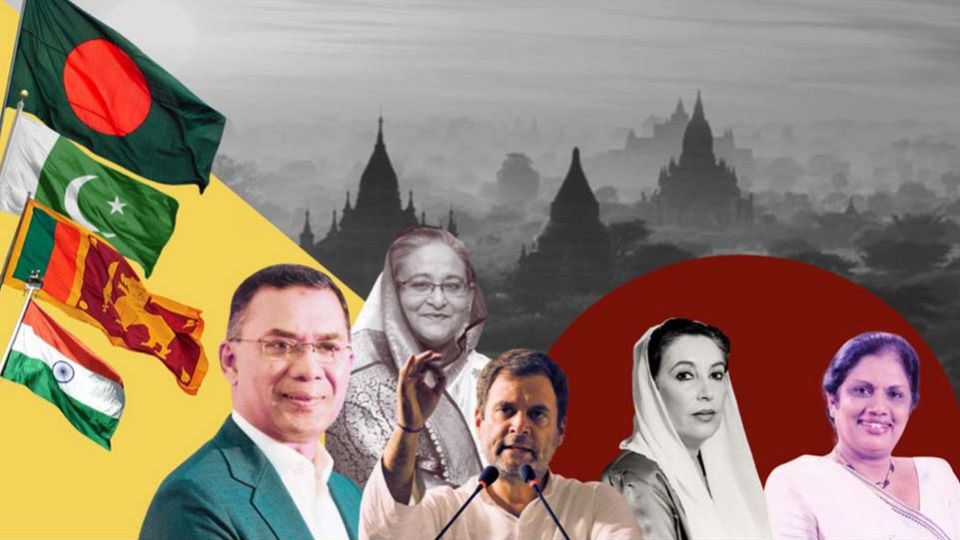November 19, 2025
DHAKA – Why do secular parties in South Asia, despite championing democracy, cling to family names? Because in a battle against religious nationalism, emotion often outweighs ideology. Politics here is rarely about policies alone—it is about identity, history, and belonging. Across Bangladesh, India, and Pakistan, religious right-wing parties have mastered mobilising faith-based sentiments. In societies where literacy is low and institutions are weak, this poses a formidable challenge for secular parties. To survive, many lean on another emotional anchor: family dynasties.
Bangladesh offers the clearest example. After the 1947 Partition, Islamic parties in East Pakistan exploited religious identity. When Bangladesh gained independence in 1971, the Awami League championed secularism and Bangalee nationalism. Yet religious parties continued framing secularism as anti-Islamic. Rational arguments had limited traction in a country with low education levels and fragile institutions. The Awami League needed something visceral—an emotional narrative strong enough to rival politics in the name of religion. That narrative emerged through Sheikh Mujibur Rahman, the charismatic leader of independence. His image as the “Father of the Nation” became a political asset, and after his assassination in 1975, his family became the living embodiment of that legacy. Sheikh Hasina’s rise was not simply about bloodline; it symbolised emotional continuity. For millions, voting for the Awami League meant honouring Mujib’s legacy. Dynastic politics became a survival strategy, not a cultural accident.
Bangladesh is exceptional in one respect: both dominant parties, the Awami League and the Bangladesh Nationalist Party (BNP), are dynastic at the top. This dual-dynasty structure deeply embeds family politics in society. Voters do not just choose parties; they choose legacies. Moreover, the historical credit for liberation is not equal across South Asia. The Awami League’s direct role in independence gives it emotional legitimacy that the Pakistan People’s Party (PPP) and India’s Congress cannot claim to the same extent.
In this case, Pakistan tells a similar story. From its inception, Islamic parties such as Jamaat-e-Islami wielded religion as a political tool, often in alliance with military rulers. Secular politics, represented most prominently by the PPP, faced an uphill battle. Zulfikar Ali Bhutto’s populist charisma gave the PPP its initial momentum, but after his execution in 1979, the party needed a way to sustain that emotional appeal. Benazir Bhutto stepped in as the torchbearer of her father’s vision, and today Bilawal Bhutto Zardari carries that legacy forward. In Pakistan’s volatile political landscape, dynastic politics has served as the PPP’s shield against both religious parties and military authoritarianism. As in Bangladesh, low literacy and weak institutions make ideological appeals insufficient; voters respond to faces, not frameworks.
Conversely, Sri Lanka illustrates the other side of the coin. While the Bandaranaike family once dominated the Sri Lanka Freedom Party, recent decades have seen secular parties partially succeed without dynastic leadership, even though remnants of family influence persist in party decision-making and local politics, reflecting the continued emotional resonance of political surnames. Add to that the roles played by party organisation, patronage networks, and local factionalism. Yet the gradual shift suggests stronger institutions and higher social development, showing that dynastic politics is not inevitable. It can fade as education, governance, and institutional strength improve.
India presents a mixed picture. The Congress party relied heavily on the Nehru-Gandhi dynasty for decades, drawing on the emotional capital of independence. When the Bharatiya Janata Party (BJP) rose with strong religious sentiment and an extensive organisational base, Congress struggled to reinvent itself beyond dynasty politics, lacking a coherent narrative or grassroots structure to counter religious nationalism. Unlike Nehru, who championed principled secularism, Indira Gandhi increasingly used religion as a political tool—appeasing minorities for votes while signalling cultural alignment with the Hindu majority. This pragmatic shift weakened Congress’s ideological clarity and made it harder to counter the BJP’s rise. In this context, the BJP ascended through religious nationalism. However, in states such as Kerala, Tamil Nadu, and West Bengal, Congress was defeated not by the religious right wing but by other secular parties. These regions demonstrate that where education and social progress are strong, secular politics can thrive without dynasties or religious identity politics. In contrast, in states where Congress lost to the BJP, lower literacy, weaker social indicators, and distinct local socio-economic conditions created fertile ground for religious mobilisation.
The pattern extends beyond South Asia. Indonesia offers a striking parallel. Despite being the world’s largest Muslim-majority country, its politics has seen the rise of Islamic right-wing movements that exploit religious identity. In response, secular and nationalist parties have leaned on family dynasties to maintain power, particularly in regional politics and even nationally, where political families dominate leadership roles. Dynastic branding in Indonesia functions much like in Bangladesh and Pakistan: as an emotional counterweight to religious mobilisation in a context of uneven social development.
Critics often dismiss dynasty politics as feudal or undemocratic. Yet in these contexts, it serves a functional purpose. Religious rightism offers voters a sense of belonging rooted in faith. Secular parties, lacking such an inherent identity, must construct alternative emotional anchors. Family dynasties provide that anchor, linking the present to a heroic past. This is not to romanticise or condone dynastic politics—it stifles internal democracy and risks corruption. However, in societies where politics is deeply personal and institutions are fragile, dynasties are not vanity projects. They have served as survival mechanisms against religious right-wing politics.
The persistence of dynasties in South Asia, and beyond, reveals a deeper truth: democracy here is mediated through identity, not ideology. Voters do not simply choose policies; they choose stories, symbols, and legacies. Religious parties exploit faith. Secular parties counter with family. Kerala, West Bengal, and parts of Sri Lanka show that this cycle can break—but only when education, social development, and institutions strengthen. Until then, family names may remain the emotional currency of secular politics.
Altaf Russell is a PhD researcher in Economics at the University of Glasgow, United Kingdom. He can be reached at altafstat71@gmail.com.
Views expressed in this article are the author’s own.


